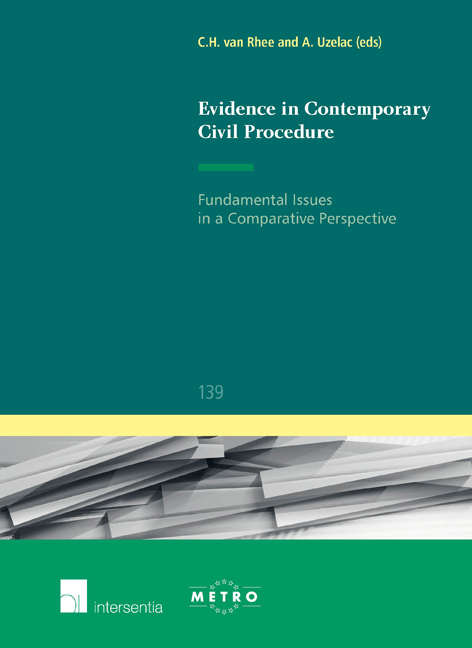Book contents
- Frontmatter
- Contents
- List of Authors
- Acknowledgements
- INTRODUCTION
- FUNDAMENTAL AND OTHER PRINCIPLES OF EVIDENCE IN CIVIL LITIGATION
- TYPES OF EVIDENCE IN CIVIL LITIGATION
- EVIDENCE IN ARBITRATION AND NATIONAL CIVIL LITIGATION
- EVIDENCE: LEARNING FROM ARBITRATION
- EVIDENCE IN CIVIL PROCEDURE IN THE NETHERLANDS: TRADITION AND MODERNITY
- TAKING OF EVIDENCE IN CROATIAN APPELLATE COURTS: WHY NO FACT-FINDING AT SECOND INSTANCE?
- EVOLUTION OF THE POWERS OF THE JUDGE AND THE POWERS OF THE PARTIES REGARDING THE TAKING OF EVIDENCE IN SOUTH AFRICA
- REGISTRAR
- EVIDENCE IN CROSS BORDER CIVIL LITIGATION
- IUS COMMUNE EUROPAEUM
EVOLUTION OF THE POWERS OF THE JUDGE AND THE POWERS OF THE PARTIES REGARDING THE TAKING OF EVIDENCE IN SOUTH AFRICA
from EVIDENCE IN ARBITRATION AND NATIONAL CIVIL LITIGATION
Published online by Cambridge University Press: 15 December 2017
- Frontmatter
- Contents
- List of Authors
- Acknowledgements
- INTRODUCTION
- FUNDAMENTAL AND OTHER PRINCIPLES OF EVIDENCE IN CIVIL LITIGATION
- TYPES OF EVIDENCE IN CIVIL LITIGATION
- EVIDENCE IN ARBITRATION AND NATIONAL CIVIL LITIGATION
- EVIDENCE: LEARNING FROM ARBITRATION
- EVIDENCE IN CIVIL PROCEDURE IN THE NETHERLANDS: TRADITION AND MODERNITY
- TAKING OF EVIDENCE IN CROATIAN APPELLATE COURTS: WHY NO FACT-FINDING AT SECOND INSTANCE?
- EVOLUTION OF THE POWERS OF THE JUDGE AND THE POWERS OF THE PARTIES REGARDING THE TAKING OF EVIDENCE IN SOUTH AFRICA
- REGISTRAR
- EVIDENCE IN CROSS BORDER CIVIL LITIGATION
- IUS COMMUNE EUROPAEUM
Summary
Introduction
The word ‘procedure’ inherently means ‘going forward’. Viewed as such, civil procedure not only aims at moving forward the dispute between the parties up to the point of its eventual determination by a court, but also aims at reflecting the evolution (i.e. change) of society and its needs. Since all legal systems are closely linked to the historical, cultural, socio-economic and political milieu in which they have developed and find application, the degree of the powers of the judge and the powers of the parties regarding the taking of evidence in a given system must necessarily depend upon a variety of factors, juridical and non-juridical, that determine its character. With regard to this, as far back as 1975 Jolowicz stated the following:
The essential question, to which each country must work out its own answer, concerns the extent to which the powers of the court can be increased without thereby sacrificing other values which are held to be vital to the due administration of civil justice.
In this contribution, the focus will be directed at the South African adversarial system of civil procedure which owes its origin to that of England. It has, however, materially steered an independent course in its development since its implementation by the English in 1828.
In terms of Sec. 166 of the Constitution of the Republic of South Africa, 1996, the courts in South Africa consist of:
a. The Constitutional Court;
b. The Supreme Court of Appeal;
c. The High Court;
d. The Magistrates’ Courts.
Although courts of appeal are entitled, on the hearing of an appeal, to receive further evidence, the focus in this contribution will be placed on the taking of evidence in courts of first instance and, in particular, the High Court as court of first instance in contradistinction to its being a court of appeal also.
Civil Procedure in the High Court: A Traditional Perspective
In this regard the presentation is confined to the action procedure. The civil procedure in the High Court distinguishes clearly between the pretrial and trial stages. The pre-trial stage is subdivided into the pleading, discovery and preparation for trial stages. The trial, in turn, is a continuous process which is characterised by the immediate (direct) and, mainly, oral presentation of evidence.
- Type
- Chapter
- Information
- Evidence in Contemporary Civil ProcedureFundamental Issues in a Comparative Perspective, pp. 311 - 332Publisher: IntersentiaPrint publication year: 2015



